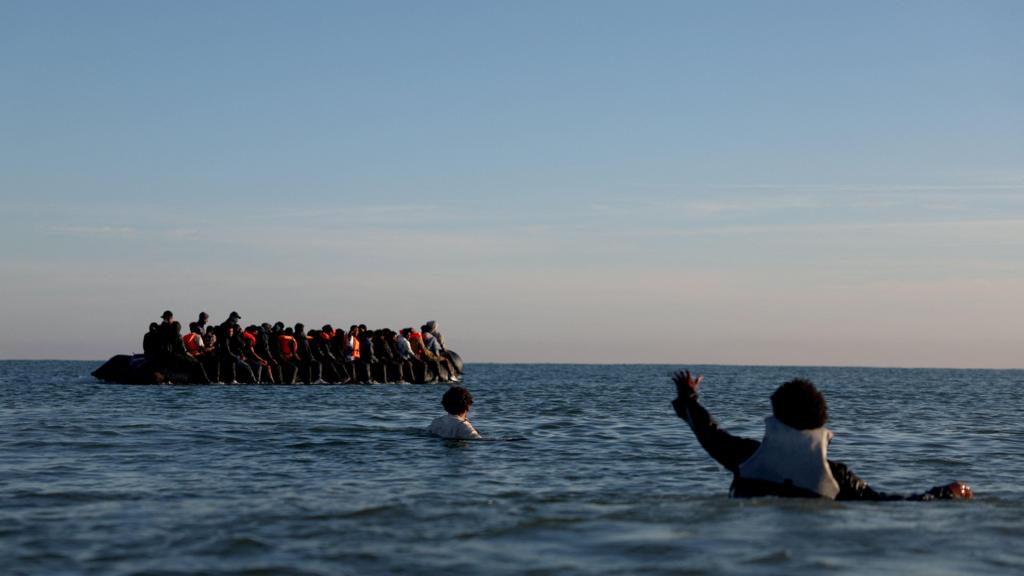The UK government is planning changes to the asylum system that will require refugees to wait longer than the current five years before they can apply for permanent settlement.
Officials have also confirmed the permanent removal of the route that allowed refugees to automatically bring close relatives to the UK, a policy that was temporarily suspended in September.
The specific requirements refugees will need to meet to qualify for settlement and family reunification in the UK will be detailed later this autumn.
This announcement comes as Sir Keir Starmer participates in the European Political Community summit in Copenhagen, where discussions will focus on addressing irregular migration.
Prior to the summit, the prime minister stated that “fundamental changes” are being implemented in the asylum system to ensure that “settlement must be earned by contributing to the country.”
These adjustments are similar to those planned for individuals entering the UK on legal visas, such as work visas, many of whom will now be required to wait 10 years to qualify for settlement.
A government source indicated that the UK had previously been “overly generous” to asylum seekers and expressed the intention to demonstrate “we get it, we will reduce the pull factors.”
Shadow Home Secretary Chris Philp criticized the proposed changes, stating: “Tweaking family rules is another Starmer gimmick that will make no difference whatsoever.”
The Refugee Council has argued that the government’s approach will not deter individuals from seeking refuge in the UK but will instead drive “more desperate people into the arms of smugglers in an effort to reunite with loved ones.”
The government has been focused on reducing the number of individuals arriving in the UK via small boats crossing the English Channel.
Upon assuming power in July 2024, Labour pledged to “stop the chaos” of the “small boat crisis,” but crossings remain at elevated levels.
Under the current regulations, refugees are eligible to apply for settlement in the UK—also referred to as indefinite leave to remain—after five years, which grants them the right to live, work, and study in the country indefinitely.
According to the government, the new regulations will offer refugees a “package of core protection” but will introduce “a new, longer route to settlement requiring them to contribute, replacing the current five years.”
Earlier this week, Home Secretary Shabana Mahmood outlined plans to implement similar restrictions on migrants seeking indefinite leave to remain.
The proposals would require legal migrants to demonstrate a high level of English proficiency, maintain a clean criminal record, and engage in community volunteer work to be granted permanent settlement status.
Reform UK has announced it would replace indefinite leave to remain with visas requiring migrants – including non-EU nationals who already have the status – to reapply every five years.
The Migration Observatory estimates that approximately 4.5 million individuals hold indefinite leave to remain, including around 430,000 non-EU citizens.
The anticipated modifications to settlement rules for refugees will be accompanied by changes to family reunion conditions.
In September, then-Home Secretary Yvette Cooper announced a pause on the scheme that allowed refugees to bring their families to the UK with “no conditions” attached.
She stated that new regulations would be announced in the coming months, but until then, refugees would be subject to the same restrictions as other migrants, such as earning at least £29,000 and providing suitable accommodation for their relatives.
Arguing for the necessity of the change, Cooper stated that it was “not fair” for refugees to face a lower bar than other migrants.
She also stated that the levels were “not sustainable” and that some councils were “finding that more than a quarter of family homelessness applications are linked to refugee family reunion.”
During Thursday’s summit in Copenhagen, Sir Keir will meet with Danish Prime Minister Mette Fredriksen.
The two leaders are expected to announce £3m to encourage people from Western Balkan countries to stay in the region rather than migrate.
The UK government is also contributing up to £5.75m – up from £4m this time last year – to Italy’s Rome Process, a scheme aimed at reducing the number of migrants crossing from Africa to Europe.
The government has indicated that the prime minister will also discuss “how to go further” on changing the European Convention on Human Rights.
On Wednesday, Sir Keir told the BBC he did not want to “tear down” human rights laws but was ready to look again at article three of the European Convention on Human Rights, which protects against torture and degrading treatment.
Sir Keir’s comments come after a Labour Party conference dominated by efforts to confront Reform UK, which has been leading opinion polls in recent months.
The Conservative Party’s conference in Manchester is due to start on Sunday.
Leonard Farruku was found dead on the Bibby Stockholm at Portland Port in December 2023.
Sir Keir Starmer has promised to “smash the gangs” which smuggle people across the English Channel.
New tests will include learning English to a high standard, paying National Insurance and not claiming benefits.
Another migrant dies attempting the journey on a weekend which has seen a number of crossings.
The prime minister told the BBC he needed “space” to make good on the promises he made at last year’s general election.

